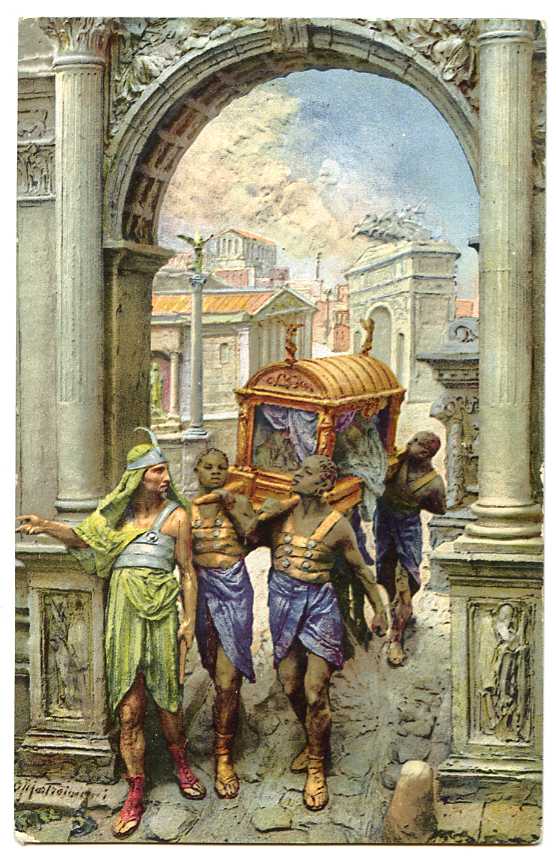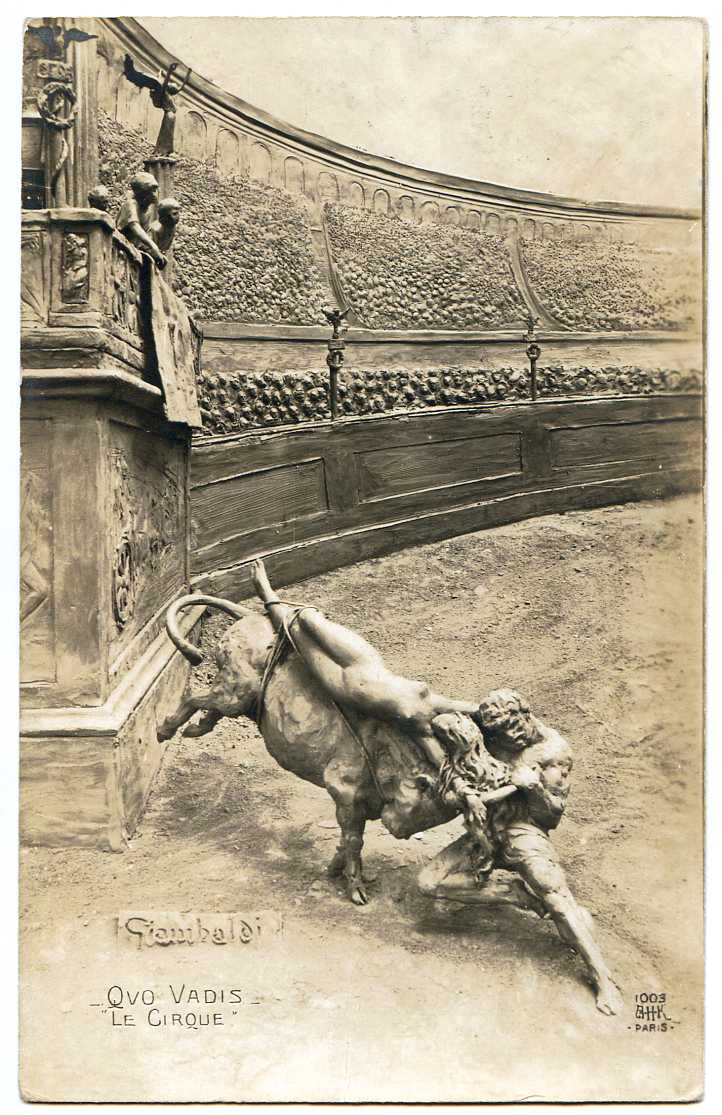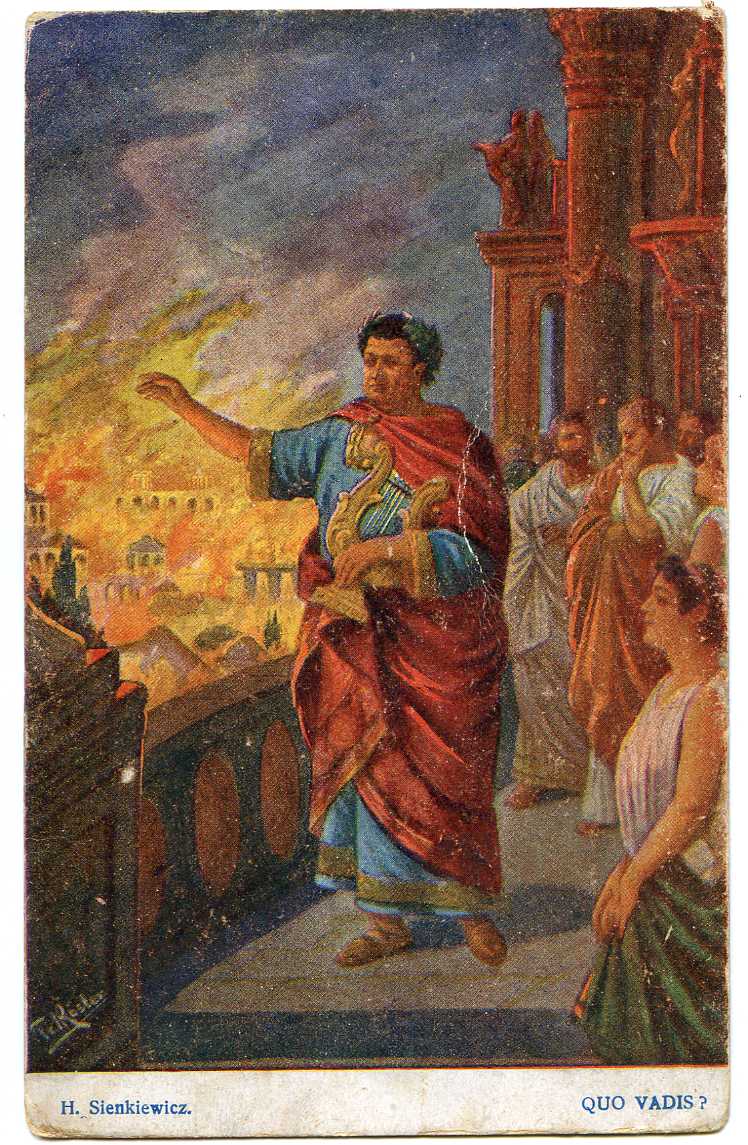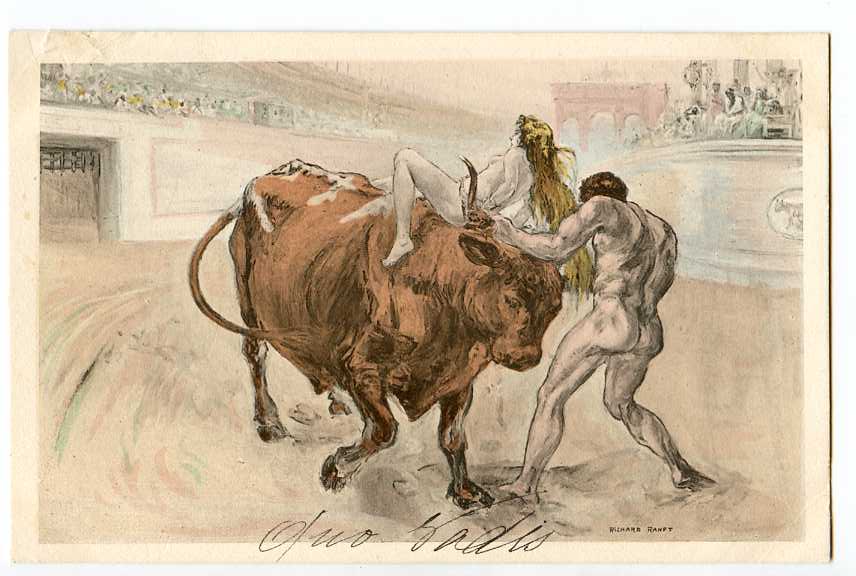
Quo Vadis Petroniusz w... w MUSEUM TOMATORUM Pamiątki Przeszłości w
Quo Vadis ( Latin for "Where are you going?") is a 1951 American epic film set in ancient Rome during the final years of Emperor Nero 's reign, based on the 1896 novel of the same title by Polish Nobel Laureate author Henryk Sienkiewicz.

Quo Vadis Neron F.R. w MUSEUM TOMATORUM Pamiątki Przeszłości w
Quo Vadis?, historical novel by Henryk Sienkiewicz, published in Polish under its Latin title in 1896. The title means "where are you going?" and alludes to a New Testament verse (John 13:36). The popular novel was widely translated. Set in ancient Rome during the reign of the emperor Nero, Quo

Quo Vadis Ligia na byku w MUSEUM TOMATORUM Pamiątki
His Quo vadis is strongly saturated with classical antiquity. The writer has achieved this effect above all by invoking, paraphrasing, quoting, and reproducing ancient literature. In addition to the frequently mentioned names of ancient poets and writers, as well as explicit or paraphrased quotes from their works, one can also find passages.

Announcing the 2021 ChapteraDay ReadAlong One Catholic Life
Henryk Sienkiewicz may be the greatest world success story of Polish literature, but the reasons Poles love him so much lie somewhere else quite different. His 1896 novel Quo Vadis - a tale of love and ambition (and religious conflict) set in the decadent Rome of the 1 st century CE - was translated into more than 50 languages and is one of the all-time best-sellers of world literature.

Quo Vadis Petroniusz i... w MUSEUM TOMATORUM Pamiątki Przeszłości w
Translated by Stanley F Conrad. Set around the dawn of Christianity with amazing historical accuracy Quo Vadis? won Sienkiewicz the Nobel Prize. Written nearly a century ago and translated into over 40 languages, Quo Vadis, has been the greatest best-selling novel in the history of literature. Now in a sparkling new translation which restores the original glory and splendour of this.

Rysunki Z Quo Vadis
On either plane, the physical or the metaphysical, this is an exciting story and is sure to send you scurrying to find the rest of Sienkiewicz's work. : The novel Quo Vadis converts a disillusioned Communist to Christianity. (Ignace Lepp, JANUARY 7, 2023, Plough) -PROFILE: A New Audience For A Polish Epic : Henryk Sienkiewicz's Trilogy Is.

Między Sacrum A Profanum Quo Vadis STELLIANA NISTOR
Nominated for eight Oscars, including Best Picture, this is the powerful story of a Roman soldier whose romance with a beautiful woman puts him at deadly odd.

"QUO VADIS" No. 12 w Kolekcja z pracami Piotra Stachiewicza w
Lygia. Lygia is a young woman who is the daughter of a foreign king and is being brought up in the home of a prominent Roman, Aulus Platius. She has become a Christian through the influence of.

Rysunki Z Quo Vadis
Quo vadis? ( Classical Latin: [kʷoː ˈwaːdɪs], Ecclesiastical Latin: [kwo ˈvadis]) is a Latin phrase meaning "Where are you going?" It is also commonly translated poetically as "Whither goest thou?" The phrase originates from the Christian tradition regarding Saint Peter 's first words to the risen Christ during their encounter along the Appian Way.

Pin by Orzechwska on lektury szkolne School notes, School, Education
Faulkner's Use of "Quo Vadis" Although Faulkner acknowledged only a relatively few writers as having been influential in shaping or inspiring his writing, the abundance of allusions, parallels, quotations and echoes in his works is convincing evidence that he was—especially early in his career—a voracious and omnivorous reader and

Rysunki Z Quo Vadis
"Quo Vadis," te firat big motion picture ever presented in America, and one of the most sensational, thrilling and dramatic films ever produced, tells a most powerful story, he play was adapted from the world famed story of Henry Sienkiewicz's novel. In its realistic and faithful effects and detail the motion picture is a masterpiece of.

Quo Vadis Neron Styka w MUSEUM TOMATORUM Skład staroci w
Abstract. The 1951 epic Quo Vadis, directed by Mervyn LeRoy, is the most famous adaptation of Henryk Sienkiewicz's novel and eclipsed all earlier and later versions made between 1912 and 2001.This chapter is intended to illustrate the complexity of the Quo vadis (novel)/Quo Vadis (film) phenomenon by examining a few representative strands. To a large extent, credit for the impact of Quo.

Quo Vadis Ligia u Aulusów w MUSEUM TOMATORUM Pamiątki
Preview [Authors and titles are listed at the end of the review.] Classicists familiar with Quo vadis most likely know it from the 1951 MGM film version, staring Peter Ustinov as the Roman emperor Nero, but they may not be as familiar with Polish author Henryk Sienkiewicz's novel itself.Originally serialized in Poland in 1895-1896, Quo vadis was published in novel form in Poland in 1896 and.

Quo Vadis Pożar Rzymu w MUSEUM TOMATORUM Pamiątki Przeszłości
To watch this new "Quo Vadis" is to suspect that there's a good chance that either of the two major Italian silent versions--one made in 1912, the other in 1924 with Emil Jannings as Nero.

Quo Vadis Ligia na byku w MUSEUM TOMATORUM Pamiątki
Quo Vadis: A Narrative of the Time of Nero is a historical novel written by Henryk Sienkiewicz in Polish. [1] The novel Quo Vadis tells of a love that develops between a young Christian woman, Lygia (Ligia in Polish) and Marcus Vinicius, a Roman patrician. It takes place in the city of Rome under the rule of emperor Nero, c. AD 64.

49+ Rysunki Z Quo Vadis
In the 1950s Hollywood began remaking the great silent Bible epics, possibly as a reaction to the return of popular revivalism. Quo Vadis is the fifth version of Henry Sienkiewicz's 1985 best-seller, and the first talking version. An expensive MGM production filmed in Rome's Cinecittá studio, Quo Vadis was the first monster Bible epic of the post-war era.